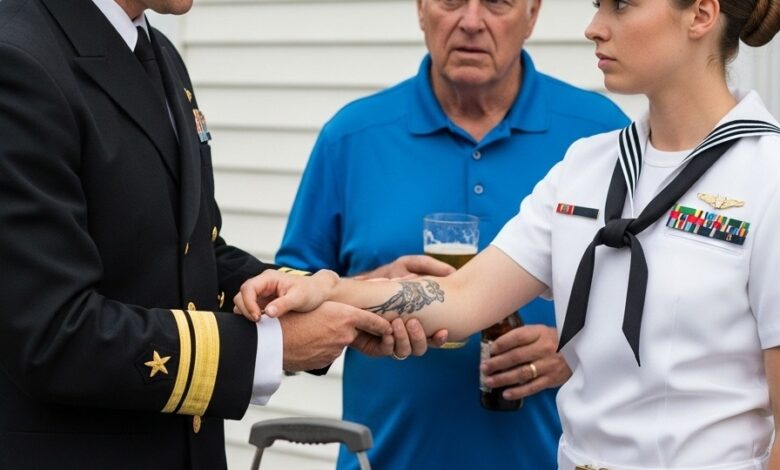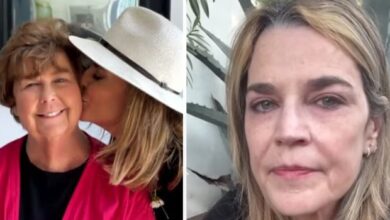
My Father Introduced Me as His Little Clerk, Then His Old Navy Friend Looked Closer and Realized Who I Really Was
My father always introduced me like I was an extra in my own life. “This is my little clerk,” he’d say, like that was the whole story. And for years, I let him. I told myself he meant well, that the nickname was harmless. But the truth was simple: he didn’t see me, and I didn’t correct him. Not until the day a SEAL read the truth right off my skin and blew the whole thing open.
The barbecue was typical suburban theater—folding chairs, cheap beer, men with military pasts pretending civilian life wasn’t choking them. I hadn’t been home in a year. I arrived straight from a change-of-command ceremony in D.C., still in dress whites because I didn’t have the energy to change. The ribbons on my chest caught the sunlight like they had something to say.
My father spotted me and grinned like nothing had ever been complicated between us. “Our little clerk is home!” he shouted. He always said it like a punchline he’d never bothered to update.
I heard the polite laughter. The kind men use when they’re trying to keep the peace instead of the truth.
He introduced me around—“My daughter, Alex. Navy intel. Paperwork, coordination, that kind of thing.” Logistics guy nodded like he knew exactly where to file me. Another man in a Recon shirt gave a vague grunt. Then one guy stepped forward—mid-thirties, posture too sharp for retirement, eyes that had seen things and catalogued exits out of habit.
“Commander Jacob Reins,” he said. “SEAL Team.”
“Good to meet you,” I answered.
We did the small talk dance until Reins’s story drifted toward the grill. That’s when he saw it—my forearm, the edge of my sleeve, and the small tattoo peeking out: a stylized trident with the number 77 under it.
He stopped cold.
His eyes flicked from the tattoo to my face, recalculating everything he thought he knew.
“Unit Seventy-Seven,” he said quietly. Not a guess.
I didn’t blink. “Correct.”
The backyard stilled. Conversations died mid-sentence. Someone’s beer can crunched under a shoe.
My father frowned. “What’s Unit Seventy-Seven?”
Reins didn’t answer. He was watching me with the expression of a man assembling truth out of scattered parts—rank stripes, ribbons, bearing, the tattoo that shouldn’t exist. Then he straightened, feet together, spine aligned by instinct older than his doubts.
“Admiral Callahan,” he said. “Ma’am. It’s an honor.”
The silence after that was brutal.
My father’s face shifted through confusion, disbelief, and something close to fear. “You’re an admiral?”
“Rear admiral,” Reins said quietly. “Two stars.”
My father looked at my shoulders like he’d never seen them before.
“You said you did coordination,” he whispered.
“I do,” I told him. “And command.”
The barbecue collapsed after that. People found excuses. The Recon guy apologized without words. Reins lingered near the driveway, torn between respect and guilt.
“I didn’t mean to cause anything,” he said.
“You didn’t,” I told him. “The truth did.”
Inside, the kitchen looked frozen in 1994. My father sat at the table like he’d been dropped there by a hard wind.
“I didn’t know,” he said, voice stripped of all his usual noise.
“You never asked,” I said.
He winced. It landed deeper than I wanted it to.
Outside, on the porch, he tried again. “I’m sorry. For making you smaller than you were. For thinking it was safer that way.”
I wanted to let him off the hook. I also didn’t.
“I need time,” I said.
He nodded. It was the first honest thing we’d exchanged in years.
The truth is, I didn’t become who I am just to spite him. I built myself piece by piece—intel, ops, deployments, decisions that kept some people alive and didn’t save others. Bahrain taught endurance. Kandahar taught limits. Special operations taught responsibility you don’t brag about.
By thirty-seven I was a commander with a job nobody could explain at a dinner party. At forty, I joined Unit Seventy-Seven. At forty-one, I took command of it. The stars came later, pinned on quietly, the way real authority tends to arrive.
Meanwhile, my father introduced me as the “Navy girl who keeps things tidy.” He had no idea I was running missions he’d lose sleep even hearing about. I let him live in his smaller version of me because correcting him felt like picking a fight with gravity.
Then came the gala—the night his two worlds collided under chandeliers and polite lies. He joked about me “finally managing to pay rent” minutes before I walked onstage as Major General Callahan. His glass slipped. His assumptions shattered with it.
Afterward he told me, “You were remarkable.”
“Thank you for sponsoring the event,” I replied.
“Why didn’t you tell me you made general?”
“You didn’t ask.”
It dug into him. Good.
But something shifted after that night. Slowly, stubbornly, he started learning. He volunteered at the VA. He listened. Really listened. He carried his pride quieter. And when men asked what I did, he finally said it straight: “She’s an admiral.”
One day he offered me his Navy ring—a piece of him, dented and honest. I refused. He mailed it later with a note: I’m learning pride can be quiet.
At the end, in hospice, he kept a notebook where he wrote questions he wished he’d asked sooner. I never got to answer them. But he died trying to understand me. That mattered.
At his funeral, I held the folded flag and felt the weight of both our lives in it. Not regret—just the complicated truth of two stubborn people finally meeting in the same story.
Years passed. My work went on—classified ops, hearings, briefings where I told men who outranked me things they didn’t want to hear but needed to understand.
Eventually the third star came. People still sometimes mistook me for an aide. I didn’t mind. Identity isn’t granted by strangers.
The real lesson landed somewhere between that backyard and the Pentagon: you are not the version of yourself someone else narrates. You’re the version you build when no one’s paying attention.
My father introduced me wrong for years. A SEAL corrected him without meaning to. But in the end, he learned because I forced the truth into the light simply by living it, relentlessly, without waiting for permission.
One afternoon, standing at my office window, ready to brief the Chief of Naval Operations, I caught my reflection. The uniform. The stars. The steadiness.
Not a clerk. Never was.
My aide appeared in the doorway. “They’re ready for you, Admiral.”
I let them wait one more breath. Then I stepped out to do what I do.




